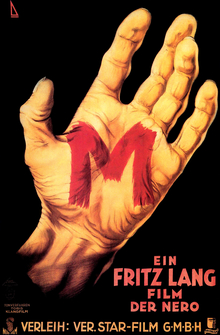M (1931 movie)
| M | |
|---|---|

Theatrical release poster
|
|
| Directed by | Fritz Lang |
| Produced by | Seymour Nebenzal |
| Written by | Fritz Lang Thea von Harbou |
| Based on | A newspaper article about the serial killer Peter Kuerten by Egon Jacobson |
| Starring |
Peter Lorre Otto Wernicke Gustaf Gründgens |
| Music by | Edvard Grieg |
| Cinematography | Fritz Arno Wagner |
| Edited by | Paul Falkenberg |
|
Production
company |
Nero-Film A.G.
|
| Distributed by | Vereinigte Star-Film GmbH (Germany) Paramount Pictures (US) 20th Century Fox (UK) |
|
Release date
|
|
|
Running time
|
111 minutes |
| Country | Weimar Republic of Germany |
| Language | German |
M (German: M – Eine Stadt sucht einen Mörder — M – A City Searches for a Murderer) is a 1931 German horror drama-thriller film directed by Fritz Lang and starring Peter Lorre. The film was written by Lang and his wife, Thea von Harbou, and was the director's first sound film.
The film revolves around the actions of a serial killer of children and the manhunt for him, conducted by both the police and the criminal underworld. Now considered a classic, the film was deemed by Fritz Lang to be his finest work.
A group of children are playing an elimination game in the courtyard of an apartment building in Berlin using a chant about a murderer of children. A woman sets the table for dinner, waiting for her daughter to come home from school. A wanted poster warns of a serial killer preying on children, as anxious parents wait outside a school.
Little Elsie Beckmann leaves school, bouncing a ball on her way home. She is approached by Hans Beckert, who is whistling "In the Hall of the Mountain King" by Edvard Grieg. He offers to buy her a balloon from a blind street-vendor and walks and talks with her. Elsie's place at the dinner table remains empty, her ball is shown rolling away across a patch of grass and her balloon is lost in the telephone lines overhead.
In the wake of Elsie's disappearance, anxiety runs high among the public. Beckert sends an anonymous letter to the newspapers, taking credit for the murders and promising that he will commit others; the police extract clues from the letter, using the new techniques of fingerprinting and handwriting analysis. Under mounting pressure from city leaders, the police work around the clock. Inspector Karl Lohmann instructs his men to intensify their search and to check the records of recently released psychiatric patients, focusing on any with a history of violence against children. They stage frequent raids to question known criminals, disrupting underworld business so badly that Der Schränker (The Safecracker) calls a meeting of the city's crime lords. They decide to organize their own manhunt, using beggars to watch the children. Meanwhile, the police search Beckert's rented rooms, find evidence that he wrote the letter there, and lie in wait to arrest him.
...
Wikipedia
